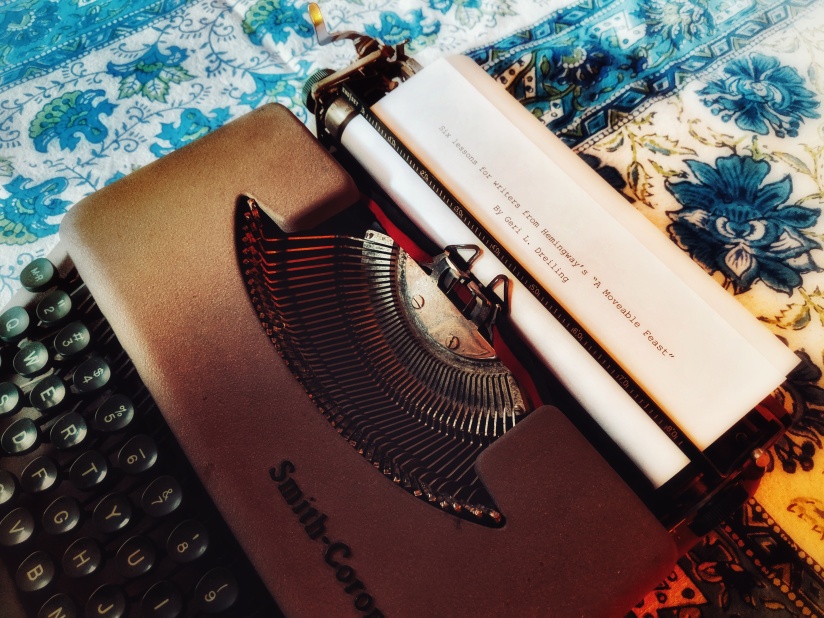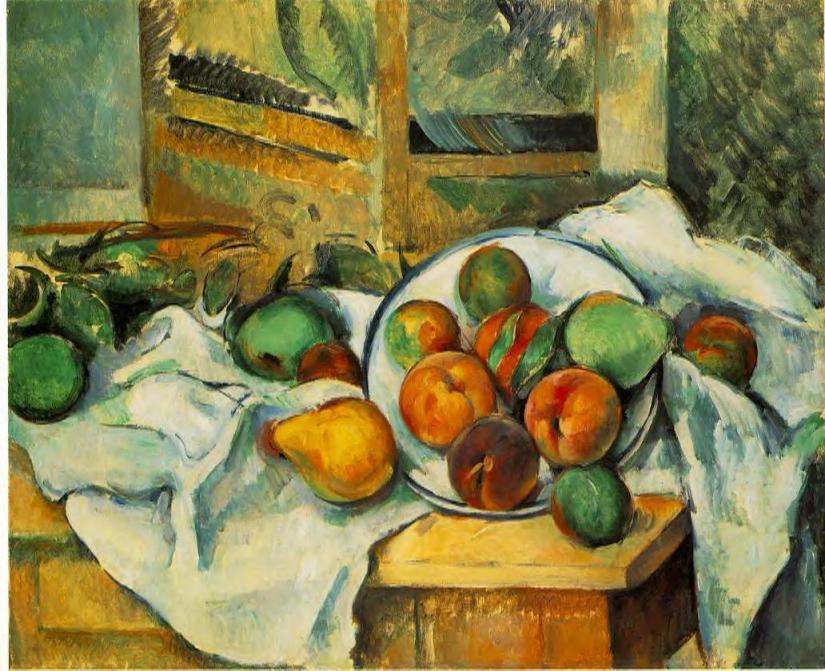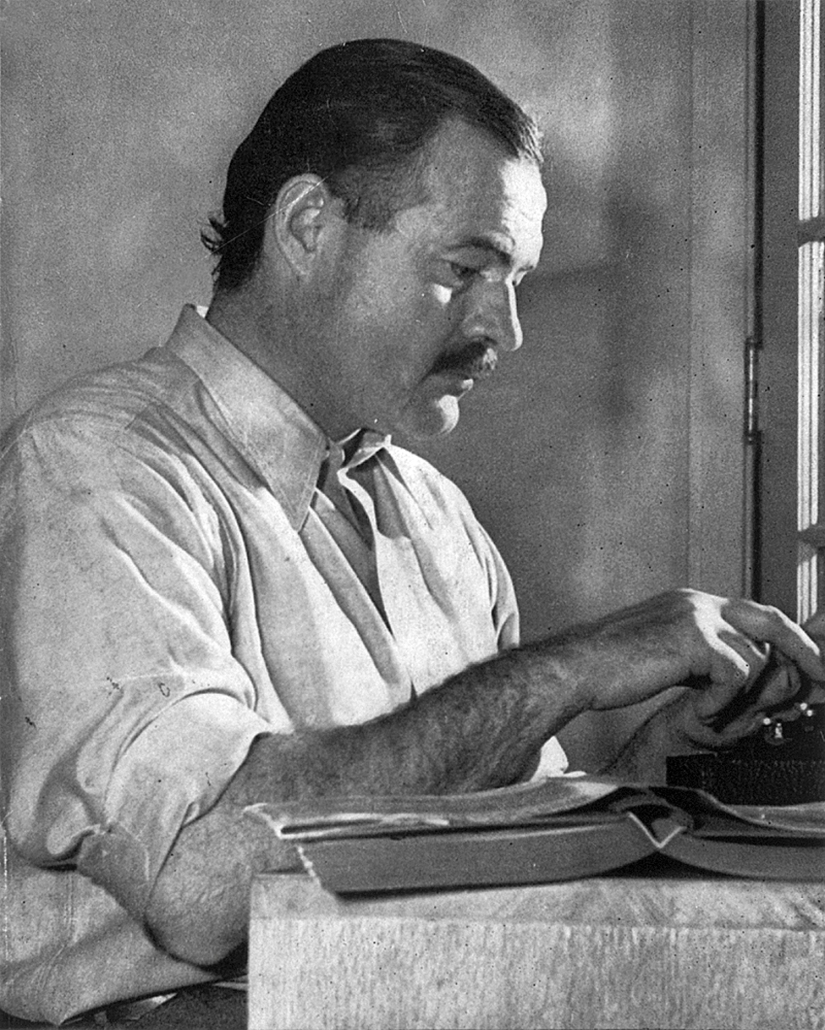
In the 1920s, Ernest Hemingway struggled to make the jump from journalist to novelist. In A Moveable Feast, he describes the steps he took to improve his writing, as well as his decision to turn down good paying reporting gigs to hone his craft.
Yesterday, I highlighted the first three lessons about writing that can be found in the restored edition of A Moveable Feast. Today, I’m sharing my last three takeaways.
4. Writers need to get away from their desks.

“Going down the stairs when you had worked well, and that needed luck as well as discipline, was a wonderful feeling and I was free then to walk anywhere in Paris.
“If I walked down by different streets to the Jardin du Luxembourg in the afternoon I could walk through the gardens and then go to the Musée du Luxembourg where the great paintings were that have now mostly been transferred to the Louvre and the Jeu de Paume…. I was learning something from the painting of Cézanne that made writing simple true sentences far from enough to make the stories have the dimensions that I was trying to put in them. I was learning very much from him but I was not articulate enough to explain it to anyone. Besides it was a secret.”
— Miss Stein Instructs, A Moveable Feast
When Hemingway stopped writing for the day, he often went out. He visited art museums. He wandered along the Seine, watching fishermen with cane poles catch fish. He visited friends. And, of course, he picked up new books to read at Shakespeare and Company.
Be like Hemingway. When you’re done for the day, close your laptop and step away from your desk. It will refill the well of creativity that you rely on for your work.
5. All writers battle distractions

“Then you would hear someone say, ‘Hi, Hem. What are you trying to do? Write in a café?’
“Your luck had run out and you shut the notebook. This was the worst thing that could happen. If you could keep your temper it would be better but I was not good at keeping mine then and said, ‘You rotten son of a bitch what are you doing in here off your filthy beat?”
— Birth of a New School, A Moveable Feast
Distractions are inevitable. When my children were young, 4 a.m. was my quiet time to write. Sometimes, I’d squeeze in a bit more work during a soccer, basketball or baseball practice. But even these strategies didn’t always save me from distractions.
Of course, people aren’t the sole source of distractions for writers. Habits and addictions can also hamper our ability to focus.
In A Moveable Feast, Hemingway recounts his love affair with horse racing – and the realization that if he was to become a great writer, he needed to stop betting on horses.
For me, the internet is the obstacle. Facebook seeks my attention. My phone pings with yet another news alert. Google tempts me with a search bar to find out answers to pressing questions like, “How many bacteria are in a human gut?”
Admittedly, the internet also offers benefits. Long-distance friendships can be maintained. Research is as easy as typing a question on a keyboard. There’s a lot of online content worth reading. And today, promoting one’s work requires social media.
One of my recent steps to curb negative habits while keeping the positive parts of the internet requires me to avoid picking up my phone when I get out of bed in the morning. Now, I won’t check messages, read the news, or like a Facebook post until after my dog has gone outside, I’ve done my yoga for the day, and I’ve written for about an hour.
If you’re looking for strategies to get control of your internet use, this article may help: “I Ran 4 experiments to Break My Social Media Addiction. Here’s What Worked.”
6. Writers get rejected.

“You got very hungry when you did not eat enough in Paris because all the bakery shops had such good things in the windows and people ate outside at tables on the sidewalks so that you saw and smelled the food. When you were skipping meals at a time when you had given up journalism and were writing nothing that anyone in America would buy….
— Hunger was Good Discipline, A Moveable Feast
Hemingway was, literally, a starving artist because he turned down journalism jobs for the sake of his writing. Even with his sacrifice and hard work – and the sacrifice of his wife and son – he didn’t see instant success.
And yet, he persevered. Hemingway was fortunate to have a wife who supported him. He had mentors and friends who encouraged him. He had the determination to keep working despite the rejection. And he had the discipline to find ways to improve his writing.
And that brings us back to lesson No. 1: Writing is hard work. There are no shortcuts.
There are other lessons to be gathered from A Moveable Feast. What would you add to the list of lessons? Please feel free to add a comment below or on social media. You can find me on Facebook, Twitter or Instagram — unless I’m observing my internet-free writing time. 🙂 See lesson No. 5.


Excellent advice!
LikeLiked by 2 people
Thanks so much!
LikeLiked by 1 person
As youth, Hemingway prevented me from being totally bored. (this was a while ago)
Great article and post. Pleasure meeting you!
LikeLiked by 2 people
Great to meet you, too! I also read Hemingway when I was young. It was fun to revisit his work later in life.
LikeLiked by 2 people
Thank you for both posts!
LikeLike
My pleasure!
LikeLike